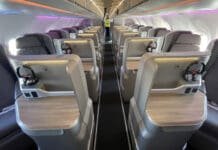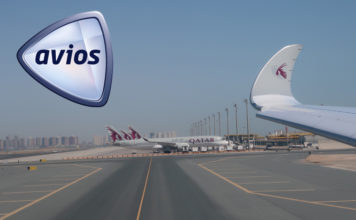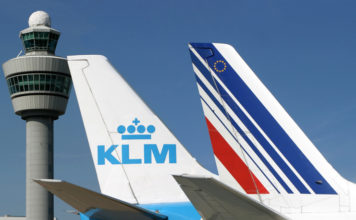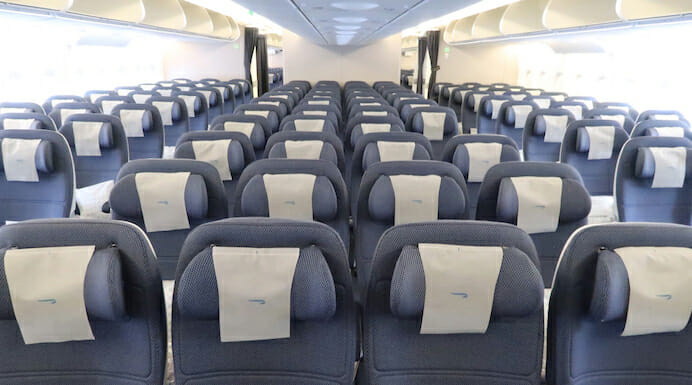
TravelingForMiles.com may receive commission from card issuers. Some or all of the card offers that appear on TravelingForMiles.com are from advertisers and may impact how and where card products appear on the site. TravelingForMiles.com does not include all card companies or all available card offers.
Other links to products and travel providers on this website will earn Traveling For Miles a commission that helps contribute to the running of the site. Opinions, reviews, analyses & recommendations are the author’s alone and have not been reviewed, endorsed, or approved by any of these entities. Terms apply to all credit card welcome offers, earning rates and benefits and some credit card benefits will require enrollment. For more details please see the disclosures found at the bottom of every page.
The UK’s aviation watchdog/regulator, the Civil Aviation Authority (CAA) has announced that it is looking into the seating policies adopted by a number of airlines following complaints from the public that they have been unfairly separated from their traveling companions.
According to a report by Bloomberg the UK has seen a significant rise in complaints from passengers traveling in groups who have found themselves split up when the airline allocates seats on the aircraft.
This is what the CAA has said so far:
The UK Civil Aviation Authority (CAA) has today launched a review of airline allocated seating polices after conducting consumer research that showed the current approach to allocated seating is causing confusion.
The CAA research* of over 4,000 consumers who have flown as part of a group (of two or more people) in the last year, found that:
- Just over half of respondents reported that their airline informed them before they booked their flight that they would need to pay to ensure their group could sit together
- Ten percent of respondents said that they had been informed after they booked; a further ten per cent said that they were never made aware by their airline that they may need to pay more to guarantee sitting together
- Although the vast majority of respondents were aware that they might not be able to sit together even if they booked as a group, almost half believed that their airline would automatically allocate them seats together
- However, two in five respondents thought that their airline would not automatically sit them together
- Around half of all passengers who sat together did not have to pay an additional charge to do so. However, seven per cent of respondents that ended up sitting together said that they had to change seats either at check-in or on-board to avoid being sat apart
- Different airlines may behave differently. Consumers flying with some airlines were more likely to report being separated from their group than others
- Of the group of respondents that paid extra to sit together, six in ten reported that they did so because of the risk that their airline might split their group up
- Almost half of respondents (46%) felt negatively towards the airline when they realised they would have to pay more to guarantee sitting together
As the body responsible for protecting and promoting the interests of consumers travelling by air, the Civil Aviation Authority will seek more information from airlines about their allocated seating practices to find out whether consumers are being treated fairly, and whether pricing policies are transparent. Our work programme on behalf of passengers in 2018 will include a number reviews into airline practices including allocated seating, improving access to air travel for people with disabilities, and ticketing terms and conditions.
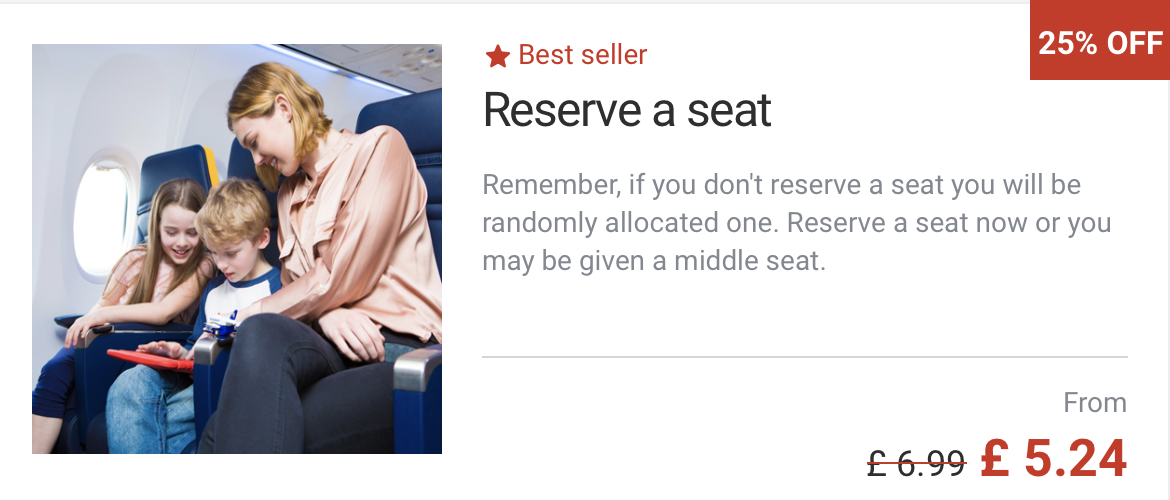 Ryanair makes it clear that not paying for a seat could see you sitting in a middle seat
Ryanair makes it clear that not paying for a seat could see you sitting in a middle seat
The Research
The CAA says that it surveyed 14,716 adults of which 4,296 had flown as part of a group in 2017. The results of the survey are as follows:
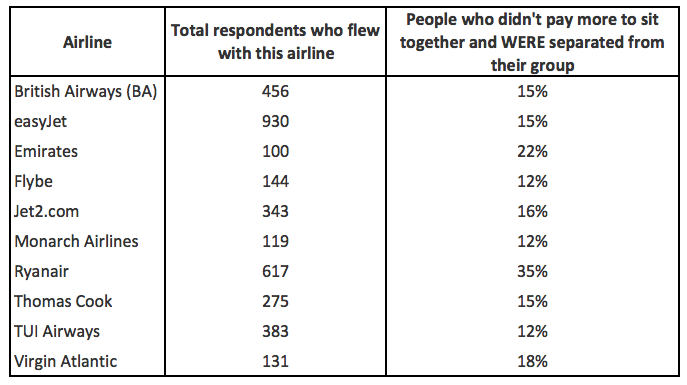
The first thing to point out is that the respondent numbers don’t add up to 4,296 so, presumably, the CAA has discounted any airlines who don’t fall under its remit.
Following the release of these figures Andrew Haines, the Chief Executive of the CAA, is quoted as saying:
Airline seating practices are clearly causing some confusion for consumers. Airlines are within their rights to charge for allocated seats, but if they do so it must be done in a fair, transparent way. Our research shows that some consumers are paying to sit together when, in fact, they might not need to.
It also suggests that consumers have a better chance of being sat together for free with some airlines than with others. The research shows that it is the uncertainty around whether their group will be split up by the airline that is driving consumers to pay for an allocated seat.
Findings from our research show that UK consumers collectively may be paying between £160-390m per year for allocated seating. Of those paying, two-thirds spent between £5 and £30 per seat and a further 8% paid £30 or more. Our work will consider whether or not these charges are fair and transparent.
If you have an opinion on this you can give the CAA your views via a survey it has published on its website (survey now closed).
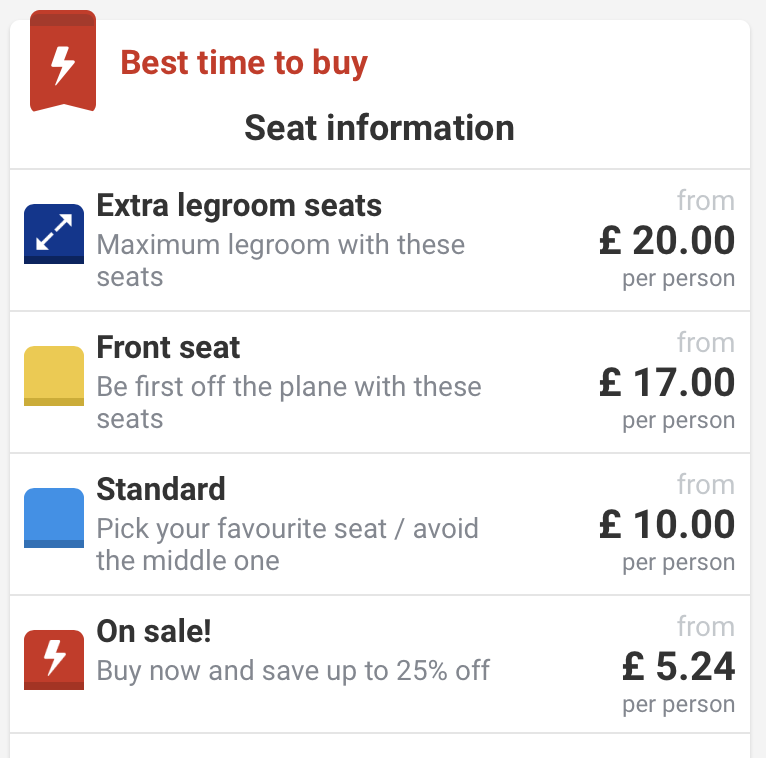 Advanced seat costs on Ryanair
Advanced seat costs on Ryanair
Thoughts
It looks like the chances of being separated from your partner or group if you choose not to pay for a seat allocation is between 12% and 18% on most airlines…but Ryanair is a big outlier.
The numbers would appear to suggest that you’re twice as likely to be split from your partner or group if you fly with Ryanair than if you fly with any of the other airlines…..and that must look significant to the CAA.
I must confess that I don’t have all that much sympathy some people surveyed…especially the ones who fall into the segment who admitted that they “were aware that they might not be able to sit together even if they booked as a group” (but didn’t pay to select seats) but then “believed that their airline would automatically allocate them seats together“.
Why would you believe that?
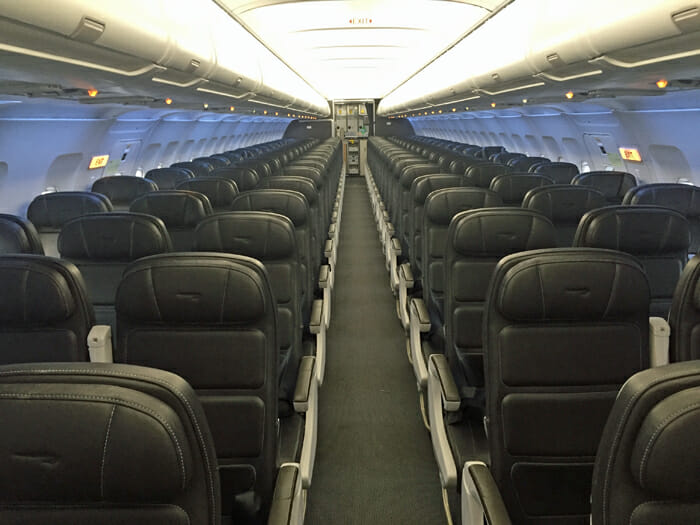
I’m also inclined not to feel too much sympathy for those who claim that they didn’t know that there was a chance that they wouldn’t be seated together if they didn’t pay to choose their seats.
Just think about this for a minute: If other passengers are paying to select seats on the aircraft then there cannot possibly be a guarantee that, when the remaining seats are divided up amongst those who didn’t pay to choose their seats, there will be sufficient adjacent empty seats to allow everybody to sit next to their partners.
That’s just logic.
I think there’s a very fine line here and it’s between airlines deliberately splitting people up so as to “encourage” them to pay to sit together (for which there is no conclusive evidence at this point) and people who don’t want to pay for allocated seating but still expect to get the seats they want.
Bottom Line
Based on the results of the survey I don’t think the CAA had any option but to look into airline seating practices – the 35% figure relating to Ryanair can’t go unchallenged – and it’s a good thing that this appears to be happening….but there are far too many people still feigning ignorance of airline policies.
This is 2018 and paid seat allocations haven’t just been introduced – they’ve been with us for years – so there’s no real excuse not to know that there’s a chance you won’t be able to sit together if you don’t pay for your seat in advance.
There also seems to be a degree of entitlement at work here and it works along the lines of: “I don’t want to pay to guarantee I get the seats I want but I’m still going to complain when I don’t get to sit where I want“.
This needs to stop.
If you want to guarantee that your group of 3, 4, 5 etc… will sit together then make sure you pay for the seats in advance. Don’t rely on the airline moving other passengers around just because you didn’t want to pay and, much more importantly, don’t rely on other passengers (many who will have paid to select the seats they’re in) to move around once boarding has completed just so your group can sit together.
Unless we get proof that airlines are deliberately splitting groups up there’s a simple rule to follow: Pay for your seats or quit complaining.

